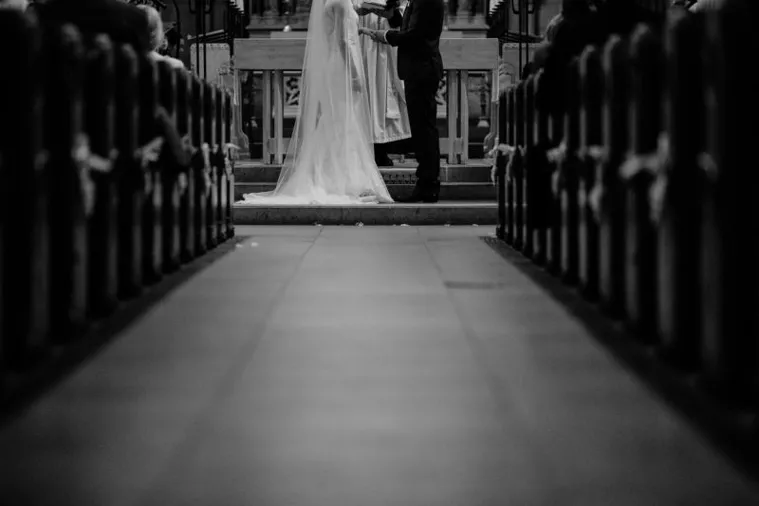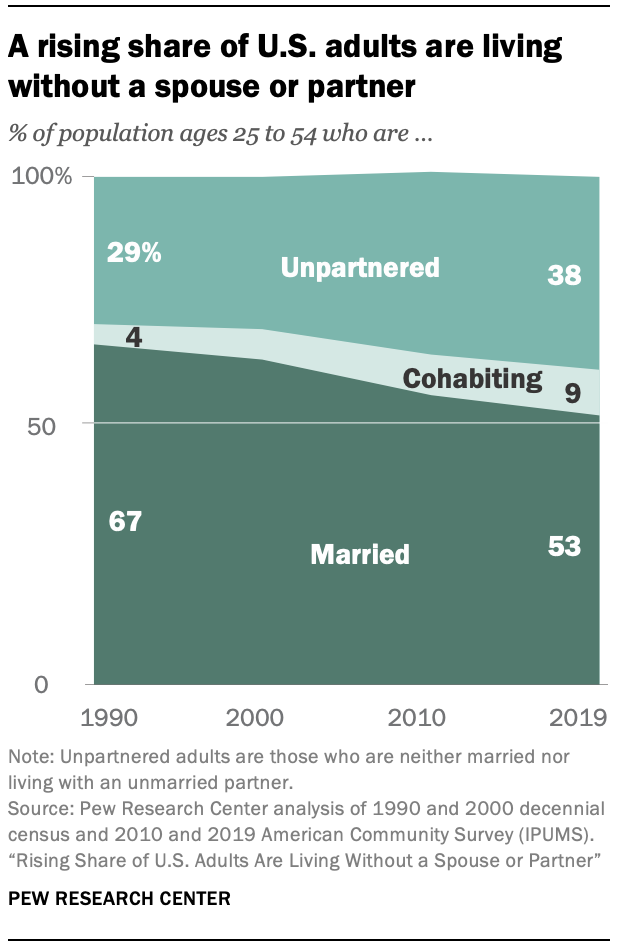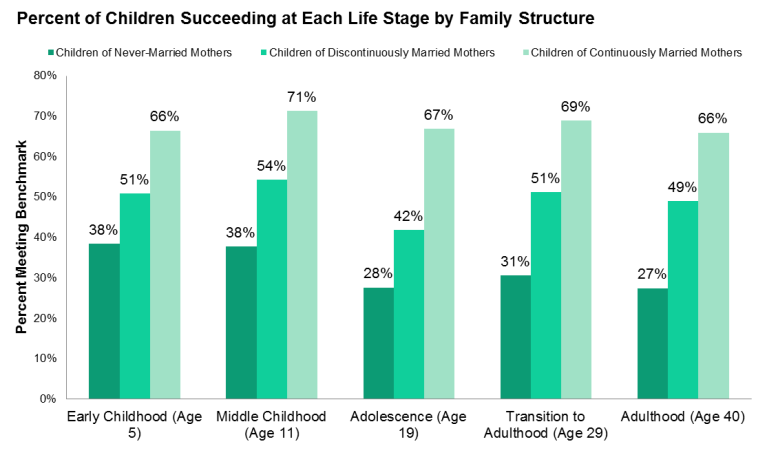Last October the New York Times published an op-ed based on a couple of surveys that noted marriage rates are falling---and have been for the last 50 years.
The op-ed directed its readers to a Pew Research Center report that found that in 2019, an analysis of census data showed that the share of American adults who were neither married nor living with a partner had risen to 38%, and all the growth in "unmarried" has come from a rise in the number who have never been married.
Why has marriage been weakened and is now being set aside when studies show there is significant value in marriage?
Be informed, not misled.
Charles Blow, writing in the New York Times, says: "When I was young, everything in society seemed to aim toward marriage...It was the way it had always been, and always would be."
He notes the Pew Research survey that found marriage rates were dropping---and doing so in light of the fact that the National Center for Health Statistics the previous year had shown marriage rates at a record low.
Yet he points out that as the Brookings Institution explained in 2014:
Children raised by married parents do better at school, develop stronger cognitive and noncognitive skills, are more likely to go to college, earn more, and are more likely to go on to form stable marriages themselves. Using our own benchmarks of success at different life stages, developed as part of the Brookings Social Genome Model (now a partnership with the Urban Institute and Child Trends), we find similar patterns.
The Brookings article goes on to explain that even though kids fare much better in a traditional family, many adults are choosing to make more money over the well-being of the children.
So, what's going on?
The war on marriage is beginning to produce results.
Unfortunately, our modern culture is full of broken marriages.
The Bible clearly tells us to "honor" marriage. For millennia marriage was honored.
St. Thomas Aquinas wrote passionately and extensively about marriage from a biblical perspective.
Eight hundred years have transpired since he wrote his beliefs about marriage, beginning with the teaching of Jesus on marriage.
"What therefore God hath joined together, let no man put asunder" (Mark 10:9). These are not empty words, they are God's words.
In recent years no-fault divorce has dramatically undermined God's institution of marriage. As a pastor, I'm fully aware that many find themselves divorced against their will. They did not make that decision.
In Matthew 19:4-6 it is written:
"And he answered them and said unto them, Have ye not read, that he which made them at the beginning made them male and female, And said, For this cause, shall a man leave father and mother, and shall cleave to his wife: and they twain shall become one flesh? Wherefore they are no more twain, but one flesh? What therefore God hath joined together, let no man put asunder."
Marriage has also come under attack from the homosexual community, demanding that marriage, an institution created by God as between one man and one woman, be revised by the state to include same-sex couples. In God's eyes, that is not "marriage."
The lack of honor is eroding the significance of the institution of marriage---which brings us to today.
A current American National Family Life survey is very revealing regarding the state of marriage today.
The Christian Post notes that the American National Family Life Survey reveals that a trend away from marriage is continuing.
The survey, taken Nov. 23--Dec. 14, 2021, found that marriage is no longer "honored" as it once was as a biblical institution.
The Post says this about the survey:
It found that while 81% of couples who got married before 1972 wed someone of the same faith, only 52% of couples who got married in the last decade reported being in same-faith marriages. Over the same period, secular marriages also grew from 3% to 16% of all marriages.
At least 40 years ago, some 72% of Americans reported having a religious wedding ceremony with a religious leader presiding. However, some 49% of the weddings recorded in the last decade alone were secular.
Newly married couples are eschewing religious wedding ceremonies that connect them to existing traditions and communities, preferring instead celebrations that reflect their own personal tastes and preferences,” said the study’s author Daniel A. Cox, who is a senior fellow in polling and public opinion at the American Enterprise Institute and the director of the Survey Center on American Life.
Just 46% of Americans who are married today report that they were married by a religious leader in a church or other religious setting. Some 16% said they were married by a religious leader in a secular setting, while another 36% said their wedding was entirely secular.
Only 30% of Americans who were married within the past decade report having their ceremony in a church, house of worship, or other religious location and officiated by a religious leader,” the study said.
Interfaith marriage — a union between people who have different religious traditions — has also grown increasingly common and makes up 14% of all marriages. Another 14% of Americans are in a religious-secular marriage where one person does not identify with a faith tradition while the other does.
The survey also revealed that "Despite the general waning of religious influence on marriages in general, some faith groups, particularly practicing Mormons and Protestants, were found to be more likely to marry someone of the same faith than any other religious group."
Almost 87% of Mormons reported their spouse is also Mormon. Evangelical Protestants registered a high 83% marriage rate with people from their faith, while 72% of mainline Protestants say they are married to someone from their religion. A majority of Catholics (65%) and Jews (59%) also reported that their spouse shared their faith.
While interfaith marriages are now more common, the study found that Americans in these unions usually had lower levels of religious commitment.
Takeaway.
Is Christian faith a stabilizing factor in marriage and family?
New research from Harvard professor Tyler VanderWeele indicates the answer to that question is "yes."
In tracking a sample of thousands of middle-aged women across the United States, he found that women who regularly attended church were 47 percent less likely to divorce than women who did not regularly attend church. He also noted that other research has come to a similar conclusion, generally finding that regular church attendance is associated with a reduction in divorce of more than 30 percent.
So, what accounts for the stabilizing power of religion when it comes to American marriages? VanderWeele offered four theories to explain how faith is linked to less divorce:
- Religious teachings often indicate that marriage is something sacred—that an important bond is created in the exchange of marriage vows. Attending religious services reinforces that message.
- Religious teachings also discourage or censure divorce to varying degrees across religious traditions, which may lead to lower rates of divorce; moreover, religious traditions also often have strong teachings against adultery, which is one of the strongest predictors of divorce.
- Religious teachings often place a strong emphasis on love and on putting the needs of others above one’s own. This may also improve the quality of married life and lower the likelihood of divorce.
- Religious institutions often provide various types of family support, including a place for families to get to know one another and build relationships, programs for children, marital and pre-marital counseling, and retreats and workshops focused on building a good marriage. Religious communities can provide important resources for a healthy marriage.
Be Informed. Be Vigilant. Be Discerning. Be Engaged. Be Prayerful.




